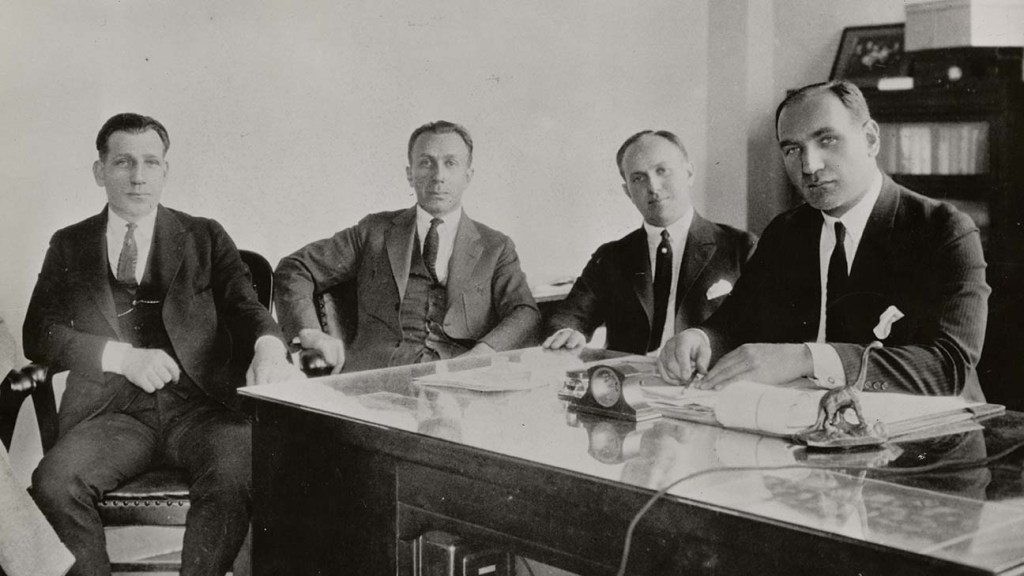
From left: Sam Warner, Harry M. Warner, Jack L. Warner, and Albert Warner, undated.
Courtesy Margaret Herrick Library, Academy of Motion Picture Arts and Sciences.
Two years ago, when the Academy Museum of Motion Pictures opened, there was an outcry over the exclusion of the film industry’s Jewish pioneers. “If you’re going to have a museum in Los Angeles tied to the Academy that celebrates arguably the most significant art form of the 20th century, how is it possible not to acknowledge the Jewish men who started it all?” said producer John Goldwyn, grandson of Sam Goldwyn, whose executive endeavors a century ago led to the formation of both Paramount and MGM. “It’s an egregious oversight.”
Now arrives, as a rejoinder, the permanent exhibition Hollywoodland: Jewish Founders and the Making of a Movie Capital. Its curator Dara Jaffe insists “this story was one we always planned to tell,” noting that some of the material had been organized before the institution’s debut, under an earlier plan for the museum’s inception which would’ve traced the arc of the studio system. Still, she acknowledges that “we were definitely very aware” of the criticism, and the institution solicited feedback from in and out of the Academy: “We wanted there to be a lot of eyes on this.”
The exhibit, on view beginning May 19, is an origin story about ethnic persecution as well as the practical costs of doing business. This tribe ended up in this Promised Land in part because of its varied topography and temperate weather, which were optimal for location shooting — but also out of a keen desire to elude Thomas Edison’s East Coast control of the Motion Picture Patents Company, which held an early monopoly over the film industry. Hollywoodland spotlights a group of mostly Eastern European émigrés and first-generation American Jews from modest circumstances who created the movie studios that came to be known by the shorthand of Hollywood. Among them were Carl Laemmle (Universal), Adolph Zukor (Paramount), William Fox (Fox), Harry Cohn (Columbia), Louis B. Mayer (MGM) and the brothers Harry and Jack Warner (Warner Bros.).
The Hollywood Reporter discussed the exhibit with Jaffe as well as author Neal Gabler, who advised on Hollywoodland and previously published the definitive book on the industry’s founding moguls, An Empire of Their Own: How the Jews Invented Hollywood.

A view of Hollywoodland: Jewish Founders and the Making of a Movie Capital at the Academy Museum of Motion Pictures.
Josh White, JWPictures/Academy Museum Foundation
How inextricable was the major studio founders’ Jewish outsiderness to their cultivation of what became Hollywood’s core aesthetics and values?
Jaffe: I think incredibly inextricable. Neal and I spoke a lot about the amount of innovation and imagination they had to transform themselves and transform Los Angeles. Neal told me early on in our work together that when you are marginalized, you need to imagine yourself included. You see it repeatedly, this outsider’s mentality of creating a space for yourself when it’s not there for you.
Gabler: I will say that from this seed the entire tree of Hollywood has grown. The outsider aesthetic is so powerful in movies. We don’t make movies about insiders; we make movies about people who are trying to make it into the inside. Every Hollywood movie is really [these moguls’] story of Hollywood. They came to Hollywood and the only reason they were allowed to enter is that nobody else had wanted to be there — Hollywood had no status in America at the time. And through this [route] to enter America, which hadn’t welcomed them, they created their own version of America, which then becomes our version of America. So, their images and values of America become the images and values of America. That tree grows.
While a distinct Jewish sensibility informed directing, writing, and producing choices, the Jewish studio moguls mostly kept overt Jewish stories and faces off the screen for many decades. Why?
Jaffe: They were worried that this industry would be torn out of their hands. They were worried they’d lose it if they were believed to have had a “Jewish agenda.”
Gabler: Fear is one of the great driving forces. Fear drives almost everything. No sooner had they entered the entertainment industry, Congress was talking about a national censorship organization through the federal government. The reason they were doing that is because they were concerned that the Jews don’t understand American values. Later this becomes red-baiting. So, [the moguls] were extremely sensitive to how they could lose their industry, and to a degree they did [lose it] with the Blacklist, since they conceded their own power during that period. The Blacklist had a lot more to do with anti-Semitism than anti-Communism.
What’s misunderstood — or simply can’t be understood — about today’s Hollywood without the context of knowing that this group of men, of remarkably similar background, are so responsible for its origin?
Jaffe: I see a cycle of anti-Semitism in how people talk about Jews in Hollywood, and how Jews in Hollywood work with Jewish lawyers and bankers. There are reasons, driven by anti-Semitism, for why they worked together in the first place, and now it’s twisted to further anti-Semitism. The rhetoric that was used against the founders is the same as it is today.
The idea of Hollywood and the place of Los Angeles developed in historic parallel with the idea of Zionism and the place of Israel. The Jewish movie businessmen, like their coreligionists across the world, had their own practical goals and utopian dreams in a Mediterranean climate, and eventually all of it gave way to complexities that have outlived them. Los Angeles is now one of the most populous Jewish regions in the world, with a dynamic mix of Ashkenazim, Sephardim, and Mizrahim. Whether or not intended, could it be said that these moguls were the Theodor Herzl figures of their own adopted homeland?
Gabler: They came to Los Angeles for the weather and to avoid Edison and to evade unions. There were geographical and practical and logistical reasons. But one of the most important reasons was psychological. As long as you’re in New York or Chicago, you were going to be circumscribed by the larger social order. But Los Angeles’ social order was much more porous at that time. This was a real draw. You could come to this place and reinvent yourself. What you have to understand is how these men transformed Los Angeles into Hollywoodland. They created an imaginative universe, on the screen and on the ground. So very much to your point, the Jews found their homeland here.









